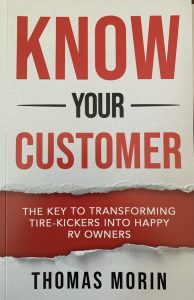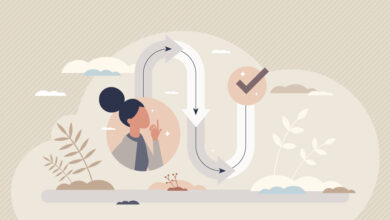Blog: Know the Customer: Part 1 of Know Their Type
 Morin
MorinEditor’s note: This is the third in a four-part blog series (and the first part of a two-part installment related to Know Their Type) taken from author and career coach Thomas Morin’s book, “Know Your Customer: The Key to Transforming Tire-Kickers into Happy RV Owners”. Part 4 will run next Monday.
As outlined in previous segments, there are many things that must fall into place to build the comfort level customers need to open the door for rapport and trust to be built when a customer visits the dealership.
None are more important than understanding the type of customer standing in front of you. It’s about the salesperson identifying the customer’s personality type in the first few minutes, so they can make complimentary adjustments needed to help the customer relax and truly connect with them.
If this doesn’t take place, there will always be a little voice in the customers head that tells them that something just doesn’t “feel right”. They likely won’t be able to put the finger on it, but will sense that something is missing in the connection with the salesperson.
No matter how informational and helpful the salesperson is, this subliminal feeling will drag on throughout their visit and, even if everything else fits, will be the sole reason customers won’t decide to buy from them.
Where to Start
Although we live in an information age, customers still seem to follow their inner voice before they can decide to buy. Things must “feel right” before they can say yes to any deal.
For years, we’ve all heard about the Golden Rule: “Treat others the way you want to be treated”.
However, in the 1996 book written by Tony Alessandra called “The Platinum Rule”, he outlines a different approach where we all should “treat others the way they want to be treated.”
This mindset is a great place to start for any salesperson working with a customer. From the moment they walk in the door, making it about them is the only way to go. Worry about sales steps and procedures later.
How To Know a Customer’s Type
In the book “The Social Styles Handbook” by the Wilson Learning Library, it outlines the steps to determine a customer’s type. Learning these steps can give salespeople a process to better understand the customer in front of you and what selling style adjustments are needed to help the customer feel comfortable. Customers like to buy from people who are like them, so this can open the door for the rapport and trust customers need to feel comfortable deciding to buy today.
Ask Two Questions
To start, there are two basic questions salespeople need to ask themselves to begin to identify the type of customer in front of them:
1) Is my customer more assertive or less assertive?
The perceptive salesperson can quickly notice if a customer is more assertive or less assertive by watching and listening closely. More assertive customers will walk toward you upon entering, say hello and offer their name and possibly a handshake. This cue opens the door for how assertive the salesperson can be by matching this behavior in their greeting. Rest assured the customer will notice this.
Less assertive customers tend to not walk toward salespeople and may even retreat slightly just before the salesperson greets them. They will not offer a handshake, not make eye contact, and may even look past the salesperson while appearing timid or disinterested.
It is important for the salesperson to notice this as a cue to be less assertive in their greeting to match that of the customer. Being too overbearing here can increase customer tension in seconds and get them back on their heels that could jeopardize everything that is to follow.
2) Does my customer make decisions using logic or emotion?
Salespeople need to ask multiple questions to get the information needed to best help the customer find the perfect RV for them. In doing so, salespeople need to be highly observant of how the customer answers to determine if the customer makes decisions based on logic or emotion.
The customer who is an engineer will answer questions with extreme detail and specifics and will likely ask informational questions on their own, clearly proceeding with a logical approach.
The customer who is more about the experience and fun of camping rather than the specific features the RVs have is clearly the emotional customer.
Answering both these questions gives the salesperson early cues as to how to proceed and forms the basis for minor adjustments they need to make in product presentation.
Four Different Types of Customers
It’s not enough to identify if a customer is more assertive or less assertive, or if they make decisions using logic or emotion. There are also four different types of customers, each with their own preferred ways of receiving the salespersons presentation and deciding if they will buy or not. Those four different types are: Analytical, Amiable, Driver and Expressive.
In addition, each salesperson has a style, which in many cases does not match that of their customer. Good salespeople fail because they try to sell every customer in the same way or because it was communicated in a way that does not match the style of the customer.
An Expressive salesperson, who tries to sell to an Analytical customer will seldom make the sale. The two styles are like oil and water.
In next week’s final segment, I will review the specifics of each style and how they act and prefer to have information communicated to them for best results.
Review the first two blogs by clicking the weblinks below:
Access Part 1 of this blog series here.
Access Part 2 of this blog series here.
 Thomas Morin is a veteran corporate executive, business owner and career coach. After joining Alpin Haus in Amsterdam, N.Y., Morin quickly became a top RV salesperson and was named trainer for all new salespeople in the dealership. He was subsequently promoted to sales manager, followed by director of employee development, training/coaching for all RV salespeople in the company. Morin is a certified life and career coach. For more information on Morin and his coaching business, visit his website at: www.unlockyourcareercoaching.com
Thomas Morin is a veteran corporate executive, business owner and career coach. After joining Alpin Haus in Amsterdam, N.Y., Morin quickly became a top RV salesperson and was named trainer for all new salespeople in the dealership. He was subsequently promoted to sales manager, followed by director of employee development, training/coaching for all RV salespeople in the company. Morin is a certified life and career coach. For more information on Morin and his coaching business, visit his website at: www.unlockyourcareercoaching.com


